39-01
The House of the High Priest [39-01]
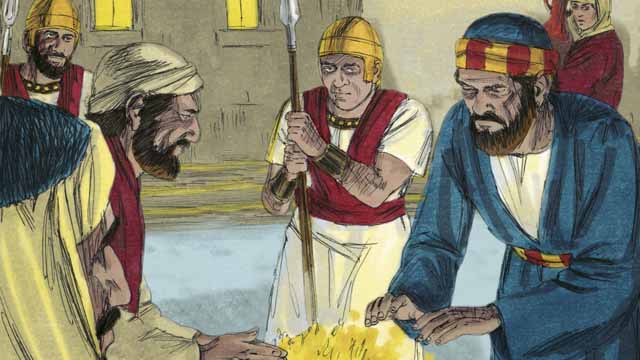
It was now the middle of the night. The soldiers led Jesus to the house of the high priest in order for the high priest to question him. Peter followed far behind them. When Jesus was taken into the house, Peter stayed outside and warmed himself by a fire.
那日半夜,士兵们把耶稣带到大祭司的房中,他们询问他。彼得远远地跟着。当耶稣被带到房里的时候,彼得躲在屋外烤火。
Important Terms:
Translation Notes:
- the middle of the night - This expression means, "halfway through the night" or, "very late at night."
- to question him - That is, "to ask Jesus questions to try to find something they could accuse Jesus of doing wrong."
39-02
The False Witnesses [39-02]
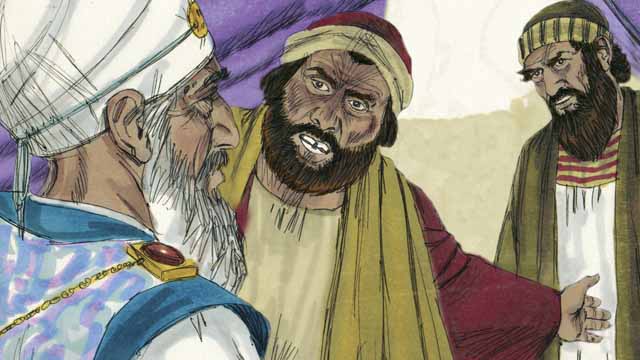
Inside the house, the Jewish leaders put Jesus on trial. They brought many false witnesses who lied about him. However, their statements did not agree with each other, so the Jewish leaders could not prove he was guilty of anything. Jesus did not say anything.
在房里,犹太首领们审问耶稣。他们带来很多人做假见证。但是他们的证词彼此不合,所以无法证明耶稣是有罪的。耶稣什么话也不说。
Important Terms:
Translation Notes:
- put Jesus on trial - This could be translated as, "had a formal meeting to accuse Jesus of doing something wrong." Usually a trial is done to find out if someone is innocent or guilty of a certain crime. In this case, the leaders were determined to make Jesus seem guilty.
- lied about him - That is, "told lies about him" or, "falsely accused him of doing something wrong."
- their statements did not agree with each other - This could be translated as, "they said things about Jesus that were very different from each other" or, "the witnesses said things about Jesus that contradicted each other."
- he was guilty of anything - That is, "that he had done anything wrong."
39-03
Are You the Son of God? [39-03]
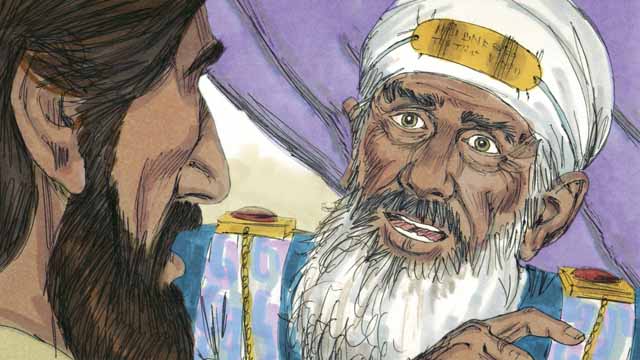
Finally, the high priest looked directly at Jesus and said, “Tell us, are you the Messiah, the Son of the living God?”
最后,大祭司直接看着耶稣,说道,“告诉我们,你是不是弥赛亚,那至高神的儿子?”
Important Terms:
Translation Notes:
- Finally - That is, "After they were unable to find any evidence against him" or, "After they were unable to prove that he was guilty."
39-04
I Am the Son of God [39-04]
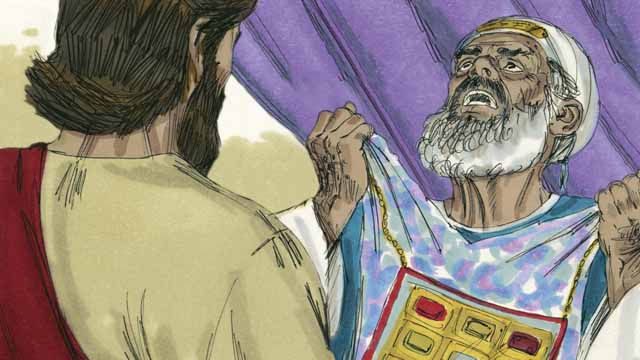
Jesus said, “I am, and you will see me seated with God and coming from heaven.” The high priest tore his clothes in anger and shouted to the other religious leaders, “We do not need any more witnesses! You have heard him say that he is the Son of God. What is your judgment?”
耶稣说,“我是,而且你们将看到我与神同坐,带着天国的能力。”大祭司生气的撕裂衣服,大叫道,“我们不要任何见证人了。你们听到他说他是神的儿子。你们的判决是什么?”
Important Terms:
Translation Notes:
- I am - That is, "I am as you said" or, "I am the Messiah and the Son of God." "I am" is also the name of God (See [[:zh:obs:notes:frames:09-14|[09-14]]]). By saying simply, "I am" Jesus was also saying that he is God. If possible, translate this so that people will see a similarity between Jesus' answer and the name of God.
- seated with God - This could be translated as, "reigning with God." Because God is the ruler over all, people talk about him as sitting on a throne in heaven. By saying that he would be seated with God, Jesus claimed that he had authority to rule with the Father.
- seated with God and coming from heaven - This could be translated as, "sitting beside God and then coming from heaven."
- tore his clothes in anger - The Jews would tear their clothes to show grief or anger. If tearing the clothes means something else in your language, you may want to substitute a phrase such as, "he was extremely angry."
- What is your judgment? - That is, "What is your decision?" or, "Tell us what have you decided: Is he innocent or guilty?" The chief priest wanted the religious leaders to condemn Jesus for claiming to be equal with God.
39-05
They Mocked Jesus [39-05]
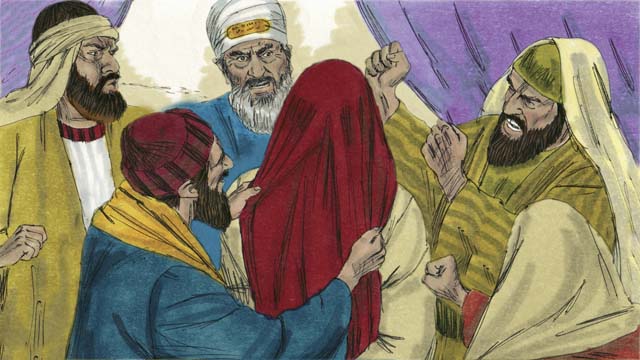
The Jewish leaders all answered the high priest, “He deserves to die!” Then they blindfolded Jesus, spit on him, hit him, and mocked him.
他们都回答道,“他该死!”他们蒙上他的眼睛,朝他吐口水,打他,嘲笑他。
Important Terms:
Translation Notes:
- they blindfolded Jesus - That is. "they covered Jesus' eyes so that he could not see."
- spit on him - This could also be translated as, "spit on him to insult him" or, "spit on him in order to say that he was worthless." This was a way of showing contempt for someone.
39-06
Peter and the Servant Girl [39-06]
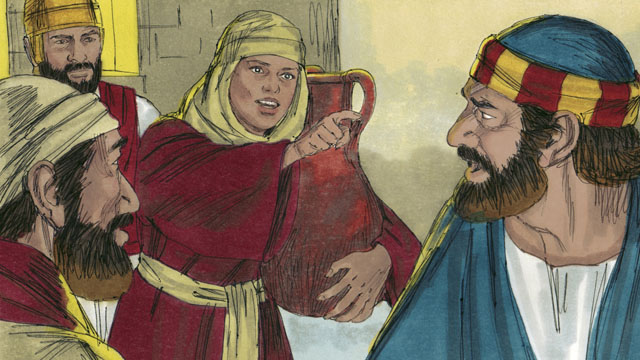
As Peter was waiting outside the house, a servant girl saw him and said to him, “You also were with Jesus!” Peter denied it. Later, another girl said the same thing, and Peter denied it again. Finally, the people said, “We know that you were with Jesus because you both are from Galilee.”
房外,一个女孩看到彼得,说,“你也是和耶稣在一起的!”彼得否认了。不一会,另一个女人说了同样的话,彼得又否认了。最后,人们说,“你是和耶稣一起的,因为你们都是加利利人。”
Important Terms:
Translation Notes:
- denied it - This can be translated as, "said that it was not true" or, "said that he was not with Jesus" or, "said, 'No. That is not true.'"
- Peter denied it again - This could be translated as, "Peter denied knowing Jesus a second time" or, "again Peter said he had not been with Jesus."
- are from Galilee - This could also be translated as, "are Galileans." The people could tell from the way Jesus and Peter talked that they came from the region of Galilee.
39-07
Peter Denied Jesus [39-07]
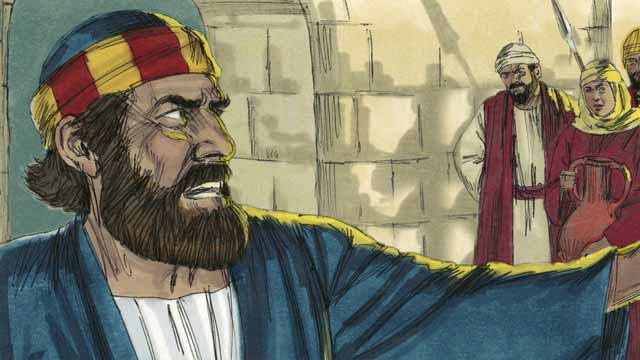
Then Peter vowed, saying, “May God curse me if I know this man!” Immediately, a rooster crowed, and Jesus turned around and looked at Peter.
彼得就发誓,说,“如果我认识这人,愿神咒诅我!”立时,鸡便叫了,耶稣倒下来,看着彼得。
Important Terms:
Translation Notes:
- vowed - That is, "said emphatically" or, "said very strongly."
- May God curse me if I know this man - This is a curse that means, "May God cause harm to me if what you say is true" or, "May God punish me if I am lying to you!" In this way Peter was saying very strongly that he did not know Jesus. He also referred to Jesus as, "this man" to make it sound like he did not know him.
- a rooster crowed - "Crowing" is the loud sound that a rooster makes. Compare how you translated this in [[:zh:obs:notes:frames:38-09|[38-09]]].
39-08
Judas Killed Himself [39-08]
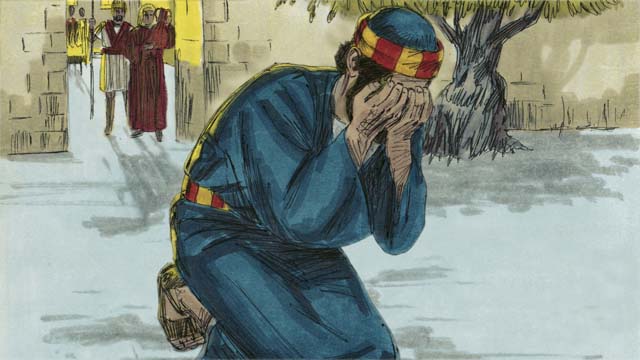
Peter went away and cried bitterly. Meanwhile, Judas, the betrayer, saw that the Jewish leaders had condemned Jesus to die. Judas became full of sorrow and went away and killed himself.
彼得跑到外边痛哭流涕。同时,犹大,那个背叛者,看到耶稣被责难,非常痛苦,便跑到外面自杀了。
Important Terms:
Translation Notes:
- cried bitterly - That is, "cried, feeling deep sorrow" or, "cried, feeling deep regret."
- the betrayer - That is, "who had betrayed Jesus" or, "who had helped the leaders arrest Jesus."
- had condemned Jesus to die - That is, "had said that Jesus was guilty and must die."
39-09
Jesus and Pilate [39-09]
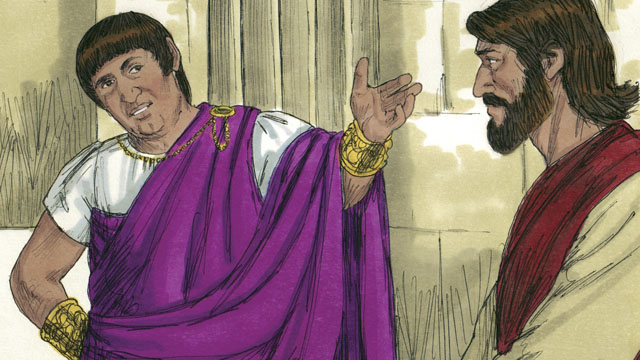
Early the next morning, the Jewish leaders brought Jesus to Pilate, the Roman governor. They hoped that Pilate would condemn Jesus as guilty and sentence him to be killed. Pilate asked Jesus, “Are you the king of the Jews?”
第二天早上,犹太人首领带耶稣到罗马长官彼拉多那里,希望他杀了耶稣。彼拉多问耶稣,“你是犹太人的王么?”
Important Terms:
Translation Notes:
- Roman governor - That is, "Roman government official." The Roman government had appointed Pilate to govern the region of Judea in Israel.
- sentence him to be killed - As governor, Pilate had the authority to condemn Jesus to death and to give approval for his crucifixion, or to set him free. The Jewish religious leaders did not have the authority to have someone killed.
39-10
What Is Truth? [39-10]
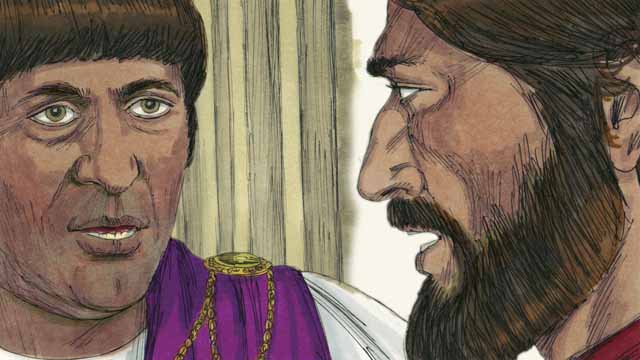
Jesus answered, “You have said so, but my kingdom is not an earthly kingdom. If it were, my servants would fight for me. I have come to earth to tell the truth about God. Everyone who loves the truth listens to me.” Pilate said, “What is truth?”
耶稣回答,“你说的对,但我的国不在地上。如果在地上,我的仆人们会为我征战。我来,是要来告诉神国的真理。任何爱真理的人必听我的话。”彼拉多说,“真理是什么?”
Important Terms:
Translation Notes:
- You have said so - That is, "You have spoken correctly."
- my kingdom is not an earthly kingdom - That is, "my kingdom is not like earthly kingdoms."
- my servants would fight for me - That is, "my disciples would fight to protect me" so that I could establish my kingdom.
- listens to me - This could be translated as, "hears my teaching and obeys me." It includes not just hearing Jesus' words, but also doing what he says.
- What is truth? - that is, "Can anyone know what is true?"
39-11
He Is Not Guilty [39-11]
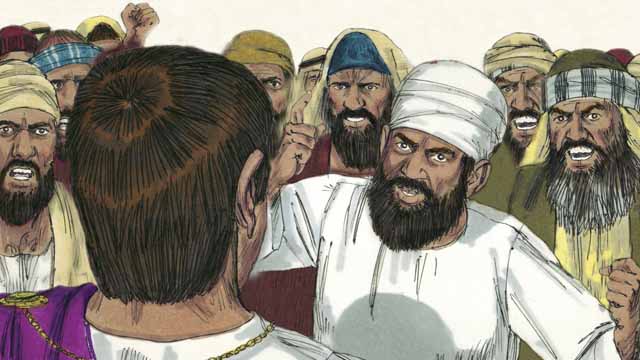
After speaking with Jesus, Pilate went out to the crowd and said, “I find no guilt in this man.” But the Jewish leaders and the crowd shouted, “Crucify him!” Pilate replied, “He is not guilty.” But they shouted even louder. Then Pilate said a third time, “He is not guilty!”
和耶稣说完话后,彼拉多走到人群中,说,“我在这人身上没有发现什么罪。”但犹太人首领和人群都叫道,“钉他十字架!”彼拉多回应道,“他是没有罪的。”但他们叫的更凶。彼拉多又说了第三次,“他是没有罪的!”
Important Terms:
Translation Notes:
- I find no guilt in this man - That is, "I do not find this man to be guilty" or, "I have examined this man, and I do not see that he has done anything wrong."
- He is not guilty - That is, "He has done nothing wrong!"
39-12
The King of the Jews [39-12]
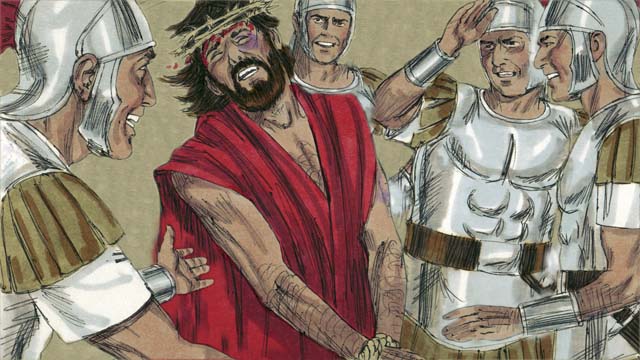
Pilate became afraid that the crowd would begin to riot, so he agreed to have his soldiers to crucify Jesus. The Roman soldiers whipped Jesus and put a royal robe and a crown made of thorns on him. Then they mocked him by saying, “Look, the King of the Jews!”
但是彼拉多担心会有暴乱,就将耶稣交给他们去钉十字架。士兵们鞭打耶稣,给他披上一件高贵的袍子,带上一个用荆棘做成的王冠。他们取笑他,说道,“看啊,犹太人的王!”
Important Terms:
* __[Pilate](https://git.door43.org/Door43/en-tw/src/master/content/other/Pilate.md)__
* __[crucify](https://git.door43.org/Door43/en-tw/src/master/content/kt/crucify.md)__
* __[Jesus](https://git.door43.org/Door43/en-tw/src/master/content/kt/Jesus.md)__
* __[Rome](https://git.door43.org/Door43/en-tw/src/master/content/other/Rome.md)__
* __[mock](https://git.door43.org/Door43/en-tw/src/master/content/other/mock.md)__
* __[KingoftheJews](https://git.door43.org/Door43/en-tw/src/master/content/kt/KingoftheJews.md)__
Translation Notes:
* __riot__ - That is, "start doing violent things in their anger."
* __a royal robe__ - That is, "a robe like a king's robe." This robe had a bright color, so it looked like the kind of robe that a king would wear.
* __crown made of thorns__ - This means that they tied thorn branches into a circle to look like a crown. A crown is an ornament that a king wears on his head to show his authority. But the crown that they put on Jesus' head had sharp, dangerous thorns on it.
* __Look__ - That is, "Look at" or, "Here is."
* __the King of the Jews__ - Since the soldiers were mocking Jesus, this could be translated as, "the so-called King of the Jews."
* _A Bible story from_ - These references may be slightly different in some Bible translations.
